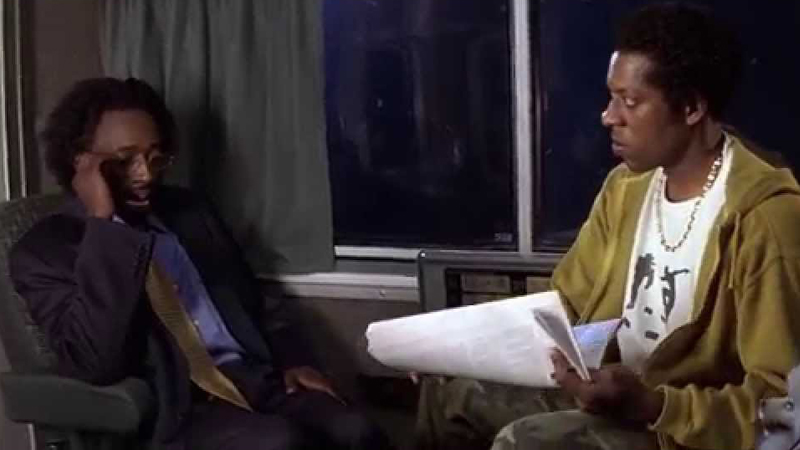

Moreover, Freddy totes around an irascible lap dog, Dolores (animal actor Willow), who gets a big laugh when she gets wet and barks “in Spanish.” The script is so hyperactively busy that it doesn't give either of the leads much room to breathe Gallo slams them from one implausible plot twist to another at a metronomic pace.

Two or three contrivances later, he's wanted for murders he didn't commit, pursued by multiple pairs of mysterious thugs on varying sides of the law, and thrown together on the lam with the “internationally known” Freddy Tiffany (Griffin), a streetwise con man with whom he swaps identities.

Herein, a Manhattan investment banker (7-Up pitchman Orlando Jones) takes the heat in a broadly sketched money laundering scheme involving a bogus soda company with ties to a recently bumped-off Mexican governor. Blame the muzzy plot, a slapdash mix of narrative switchbacks, thin characterizations, and cheesy action scenes assembled by writer/director George Gallo, who's taken a long fall from his script for the infinitely more polished and cohesive 1988 road romp Midnight Run. But if the tagline proves true, this comedy caper signals a thousand-year downtick. It might just be your own shadow.Touchstone Pictures calls Double Take “a Trading Places for the new millennium.” Sure, it's got a scene on a train, a prince-and-the-pauper switcheroo, a story that's more or less about investment-banking tomfoolery, and even a certain amount of urban edge. What is the familiar silhouette near the fire exit? A rotund looking man with a cigar. Like the best Hitchcock thrillers, it will have you glancing nervously over your shoulder. But there will almost certainly be others who will consider this to be one of the best films they have ever seen. Some will find the apparently random nature of its early scenes so irritating that they'll just give up. Not everybody will cope with Double Take. Gradually they, too, become more sinister. The audience I saw this with laughed out loud. They're knowingly twee, stereotypical, comic.

To increase our viewing pleasure, Mr Hitchcock explains, advertisements will appear at intervals throughout this film. The tension is escalating, real and fictional. Families stock up on food and learn the drill for retreating to nuclear fallout shelters whilst politicians from either side match each other's insincere grins in a curious doppelgänger effect. Meanwhile, The Bay of Pigs debacle ensues. It's television that sinks Nixon, who came across so well on radio, in his famous debate with Kennedy. Never fear, Nixon boasts, for America has the miracle of colour television. The Russians are ahead in the space race. Elsewhere, the world of 1962 is troubled. Alfred Hitchcock (or one of several people who can be Alfred Hitchcock as the occasion requires) narrates the increasingly sinister story of his encounter with an older man who claims to be him, and who insists it is 1980. Despite recognising their peril, the birds were unable to steer any other course.Īt first the course that Double Take steers will seem haphazard. "I thought you'd already gone up."Īdapting The Birds from Daphne du Maurier's novel, Hitchcock drew upon a real life incident in the California town of Capitola where poisoning apparently drove local birds mad and sent them slamming into rooftops. In this instance he is directing a body double in his role as he sets up an early shot, when a mysterious phone call lures him away to a lonely production office. As fans will know, Hitchcock liked to have a cameo role in all his films. I forget which way round it is, but the point is, two of you is one too many."īased on the Jorge Luis Borges essay 25 August, 1983, Double Take is set in 1962 - or possibly 1980, as will become clear - when the master of suspense is filming The Birds. "If you ever meet your doppelgänger, you're supposed to kill him - or he's supposed to kill you.


 0 kommentar(er)
0 kommentar(er)
